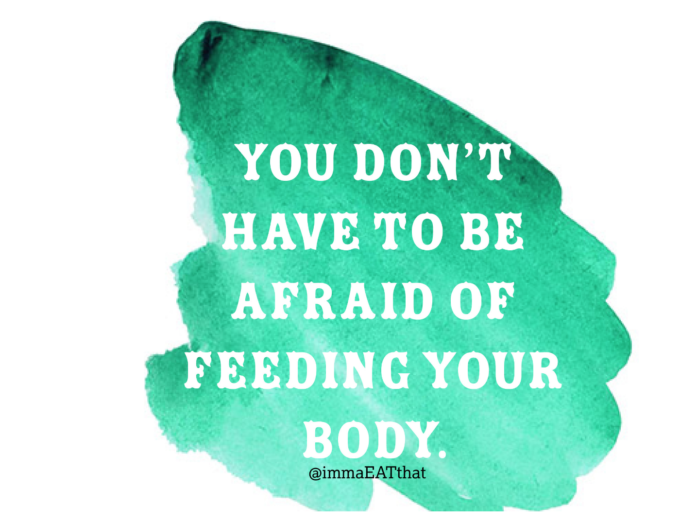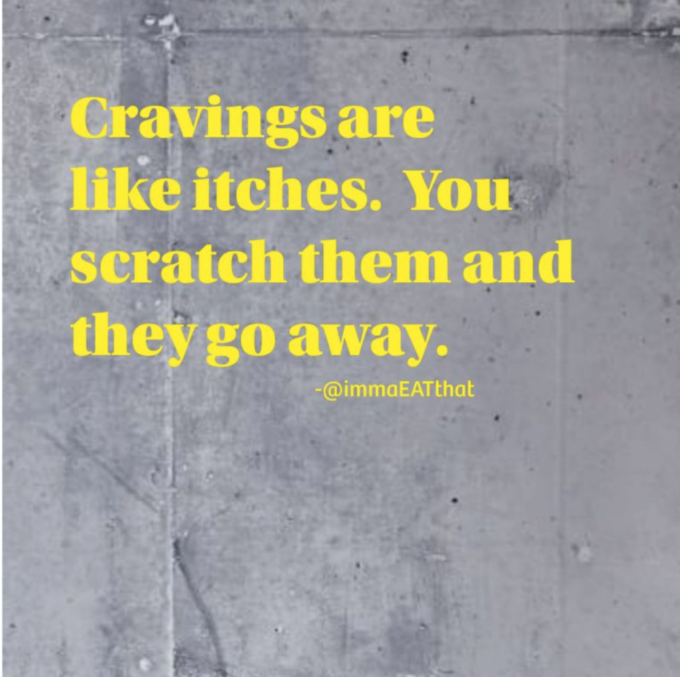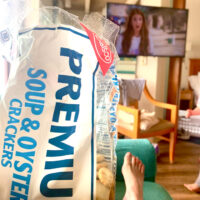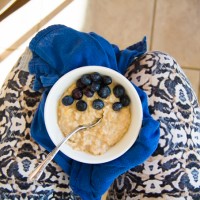What is something you have a hard time reframing?
Giving your brain new language to use when interacting with food and your body is a part of the recovery process for those with disordered eating. Adding in some go-to phrases for your brain, you know, new ways of thinking, that help you interact with food and your body in a more healthful way can be very wise.
An example with food could be, you used to say “ice cream is bad,” but through recovery you educate yourself and can now say, “ice cream is carbs and fat. Those are two essential macronutrients for my body.”
Or, “I have to calorie count so I don’t lose control over my body size” goes to, “calorie counting is an external activity that prevents me from learning how to self regulate my food intake. Calorie counting keeps me from using internal cues of hunger, fullness and self-satisfaction, which are better guides to my eating.” Or, more succinctly, “I don’t have to be afraid of feeding my body.”

When it comes to body size, an example may be, “I feel bloated, therefore I did something wrong with food.” The reframe would be, “regardless of movement level or food eaten, bloating is a normal side effect of being human.”
Another may be, “I can’t trust my cravings” becomes “cravings are like itches. I scratch them and they go away.”

An unhealthy thought around exercise may be, “moving my body everyday is healthy,” is reframed to, “taking care of my body everyday is healthy, sometimes that means movement, sometimes that means rest.”
Comment below with food judgements or negative body thoughts you have that you have a hard time reframing. Another reader and/or me can jump in and reframe to help you gain some new language so you can more healthfully interact with food or your body. This will allow you, with effort, to change automatic negative thoughts into more flexible and helpful thoughts.





Didn’t realize I was believing that about bloating until I saw you write it out! Thanks for naming that thought. “I did something wrong with food” is a thought I have had lately when my shorts seem tighter than I remember.
<3
I was raised in a house that rarely had any “junk” food in it. My parents were super “healthy” and they didn’t keep that kind of stuff in our house. Hence why I never learned how to regulate around many types of “bad” foods. Now, as I raise my kids, my house is full of ALL types of food. Sometimes, thoughts creep in and say, “I have too much junk food in this house.” Luckily, I am experienced and far enough along in my journey of being a normal eater that I can say back to these thoughts, “Having a wide variety of all types of food in my house is what is most healthy for me and my family. Modeling restriction is not healthy; Learning how to trust hunger and innate wisdom is.”
YES, AMY! You are raising competent eaters who can peacefully and confidently interact with highly palatable foods. I love this!
“My body is getting bigger due to me having no food restrictions anymore.
And I don’t like it”
?
My body is finally getting the nourishment it needs to feed the soul it houses.
Yes, Haley! Hannah, I’d also add: “My body isn’t just getting bigger, it’s finding it’s set point weight range. The body size I’ll be able to effortlessly maintain. The body size I’ll be when I don’t have to feel stressed around food / exercise.”
If I may add, for me in these moments it’s really helpful to focus on body neutrality. I tell myself: “I don’t have to love my body, but I can love the life it allows me to live”, “life positive, body neutral”, “I don’t have to love it, I can juste learn to tolerate it in the first place”. And as Kylie said, focusing on the sh*t aspects of restricting vs everything else you’re gaining with weight. sending you love & strength <3
I’m so grateful for the years of work I’ve put it when I felt like I would never see any recovery at all. Still, today I saw myself in the reflection picking up my infant and I muttered “ugh I look gross.” I immediately stopped and was shocked because I have worked on my inner voice for years and I usually don’t hear things like that anymore. But I pushed into it and got curious instead of moving on. I realized I had been feeling insecure and hurt from a conversation with my husband this morning and had been closed off to him because I felt rejected by a comment he made(that had nothing to do with me.) I was taking my uncomfortable emotions(insecurity, jealousy, etc.) out on my body instead of facing them. Years ago I would have restricted my food or damaged my body instead of facing my feelings. I’m simply sharing that even though most days I consider myself “recovered” we still can have sinful attitudes, bad days or be affected by culture and it catch us by surprise. That’s why it’s important to follow safe accounts(like yours) to make sure we stay accountable to this journey we have committed to!
So good, Savanna. Thank you for sharing this with everybody!
A thought that I still notice coming up a lot is “I shouldn’t be hungry again already” (either because I thought I ate “enough” or “too much” or need to eat at certain times/frequencies).
I struggle with this one, too! How about, “My body is on my team and I can trust her/him to tell me what she/he needs, even when it feels scary and new.”
How about, “My body is my best indicator of what I need to be satisfied, and it’s okay if that’s different than what I first thought.”
A thought I struggle with is: eating xyz will make me feel bad/guilty/anxious/unsafe and I will regret it, so I shouldn’t risk it.
What about, “Making peace with food and my body is scary. I can take a break to give myself some self-compassion and see if I feel mentally ready to try that food. It’s okay if I’m not ready, but it’s also okay to try it if I decide I am.”
Something that I commonly struggle with is that I should only eat one “treat” per day. For example, if I eat a cookie that a co-worker brought in during the day, I shouldn’t agree to get ice cream with my husband that evening. Sometimes, I really want to eat multiple “treats” in a day, but guilt prevents me from doing so.
Reframing the word “treats” to “snacks” may be helpful here, Jordan! Instead of the words, “dessert” or “treat” everything is now just a snack. It is protein, carbs or fat. The word treat tends to have baggage with it for many in ED recovery, so calling all food meals or snacks can help.
I didn’t realize I felt this way until you said this, Jordan! And I love the suggestion, Kylie!
So good, Kylie! I love these little tidbits of wisdom you share. A helpful reframe for me is to look at foods that diet culture calls “bad” as simply delicious macronutrients that my body enjoys :)
Love it, Megan! Thanks for sharing!
Oh this is so good! Something that I have a hard time reframing is my fullness. When I’m full I have a hard time not judging myself for the amount of food I’ve eaten (even if it’s a “normal” portion). So often it’ll sound like, “Ugh, I ate too much,” or “I didn’t need to eat all of that/that much.” Would love to hear your thoughts!
Hi Katie! Two ideas that may help…
The first one is: fullness is the point of eating. If you are feeling guilty for feeling full after eating…remembering that fullness is *THE* point of eating could help. You did it! You found fullness and this is good.
The next one is that fullness is only one indicator of when you should stop eating. Satisfaction should also be considered as you’re deciding when you’re done with your meal/snack/dessert. To have a satisfying meal, we all need to be eating food that is pleasant. Without pleasant and crave-worthy food, we won’t find satisfaction and this can make the eating experience complicated (i.e. a meal with a large amount of vegetables and minimal fat/carbs could lead to one feeling overly full due to fiber, but never able to reach satisfaction as fat and carbs are needed for that. Fullness AND satisfaction is the goal.
Thank you! These are super helpful, and the fullness/satisfaction has been something I’m working on. These reframes will definitely help me in this process!
One thing I have noticed myself thinking is, “How can I be thinking of food again already?” The adaptive response I was able to develop around it is, “Noticing that thoughts about food pop up tends to be my first sign of hunger. I can decide whether I am comfortable waiting a bit or having a snack now. If I wait too long, though, I’ll be too hungry and uncomfortable.” It has given me a lot of peace around having snacks.
This is sooo helpful! I used to wait to eat for too long to the point where I would get excruciating headaches. It’s so nice to know I don’t have to wait for that terrible side effect for me to realize I’m hungry. When food starts being on my mind, I know that’s a good sign for me to think about what I want to eat next.
Yes! Thinking about food is an early sign of hunger.
It’s okay to eat when I’m not hungry. I’ll always get hungry eventually, so I might as well eat to prevent being starving (which is unpleasant to experience) later.
This sounds like a wise way to interact with food!
Christie, that advice is so so helpful for someone like me. Truly. Thank you.
I love this. I always used to feel that I had to have a certain level of hunger to eat or that was somehow a bad thing. One thing I heard someone else say that was helpful was, if you wat when you aren’t hungry or to the point when you are fuller than you intended, it really just means it will be a little longer until you feel hungry again. Doesn’t seem like that big a deal when I think of it that way.
One thought/worry I’ve had is, “if I don’t plan and track my food I won’t eat enough protein.”
If there’s a protein source at every meal people are very likely doing just fine on protein amount.
How about, “My body knows better than any external tracker how much protein (and all other nutrients) it needs. I trust my body to tell me if/when it needs more protein, and I trust myself to honor my body’s signals in order to meet its needs.”
I have panhypopituitarism and one thing I often think is
“Maybe I’m not really hungry, maybe my cortisol/blood sugar is just low” and so I try and put off eating until I think its an acceptable time.
I don’t work with panhypopituitarism enough to give a well informed opinion on this! Sorry, Jas! A dietitian specializing in panhypopituitarism working with a non-diet dietitian could be the best guide here!
I struggle a lot with “I don’t deserve to eat if I haven’t exercised”. Any ideas on how to re-frame this to something positive? Thank you (:
This mindset has really helped me, especially on days where I “move less” than other days and find myself thinking “I didn’t move xyz like the other day where I move/ ate xyz” and start comparing those things.
Regardless of if I scale a mountain, or lay on the couch all day, my body NEEDS food to survive. It has a job to do- it’s constantly, at a cellular level, working to keep us alive. And that takes energy! Our bodies are machines, and don’t need to “earn” food, which is a necessity. Without it, can’t function the way it should. Food is fuel for every day, regardless of if we moved/ did not move that day!
Hope this helped! :)
I used to feel this way a lot. One thing that was helpful to me was reading about all the different things our bodies do every day just to maintain homeostasis- your organs functioning, muscles moving involuntarily, etc. Your body uses energy all the time, including when you are sitting on the couch and sleeping! When I have lingering thoughts like the one you described, I reflect on those bodily processes a bit and remind myself, “My body needs energy from food to get through the day and do all kinds of things, whether those are intentional or not.”
“The more sugar and dairy I eat, the more acne I have. I like having clear skin.”
Hi Emily,
This reminds me of how some foods give me a stomachache (it’s typically not just the food, but eating the food when my gut is stressed out because I am stressed out), but regardless sometimes I decide it makes sense to have the stomachache and I eat the food and other times I decide not to have the food. It may be the same with you and foods that may contribute to acne.
Wondering if Kylie or another reader has words of wisdom on how to stop body checking. It’s a habit I’ve had for a long time and one I really want to stop, especially as my daughter is nearly two years old and I really don’t want her to grow up with a mom who body checks. I, at times, have out sheets of paper up on my mirror to prevent me from doing so and I think that can be helpful for getting out of the habit of it but obviously it’s more deeply rooted than that. Welcome any input anyone has on how they have gained freedom from this! Of course I also notice it amps up in stressful times (like this one).
I have been through this exact struggle and so whenever I noticed myself body checking a lot I would ask myself “how is body checking bringing me happiness or helping me in any way?”
For me, my answer was always that it wasn’t helpful at all or bringing me any happiness. If anything it made me feel worse, so what was the point? When I truly realized that there is no real point of body checking, it helped me to stop feeling the need to do it so often. I think you’re right when you say it is more that just a habit because I noticed that I felt the need to body check a lot when I didn’t feel good enough in some way, or when I was comparing myself to how others look. Just reminding myself that body checking won’t do anything to help me or make me happy helped me realize that there are other things I could do with my time that actually matter. Just know it is possible to be free from body checking, especially once you truly realize how useless it is. I hope this helps!
To be perfectly raw and honest I have dropped out of ED treatment twice because the idea of getting physically bigger was unbearable to me. I hate to admit that I still have the belief that I don’t deserve to live unless I’m very, very thin. I know it is from a host of reasons and have addressed those with years of trauma therapy but I still am not even close to being able to return to ED therapy. I would love to know if anyone else overcame these thoughts and how/what was finally a lightbulb moment? Or anything else that others have been through…
Hi Emily, glad you’ve sought healing via trauma therapy and you are aware of the host of reasons that thinness feels safest for you. For me, getting bigger and actually experiencing what it was like to be in a bigger body was something that helped me. I realized the anticipation and fear of that body size was worse than being in the actual body size. In my recovered body (one that is bigger), I still care for myself well and do everything I love/everything in line with my values. I am me regardless of the flux of fatness on my body. Sometimes (most times) I think you have to feel that level of fatness on your body to realize that is true. It’s not always easy, but the freedom that goes along with feeling relaxed around food and exercise makes it worth it.
I have learned that I sometimes get loose stools, not from the food itself, but from being in a stressed out state before, during, or after eating. This realization has created anxiety for me. I now sometimes get triggered by the thought of eating. How can I reframe this? Thank you – great article! :)